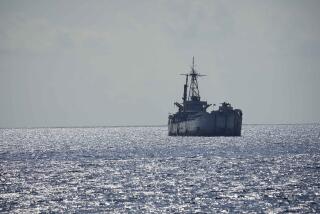Muslim Leader Fears Backlash in Philippines
MANILA — Amid growing criticism that the Philippine government would be acting illegally if it let U.S. troops engage in combat here, a top Muslim leader warned Saturday that the planned deployment could trigger an anti-American backlash.
“I am afraid this might be fraught with danger,” said Parouk Hussin, governor of the Autonomous Region in Muslim Mindanao. “People are very poor, but everyone owns a gun.”
Pentagon officials said last week that the U.S. will send about 3,000 troops to the Philippines to help hunt down members of the Abu Sayyaf, a ruthless gang of kidnappers who style themselves Islamic militants.
Despite the Pentagon announcement, the office of President Gloria Macapagal Arroyo continued to maintain Saturday that U.S. troops will not have a combat role and will serve only as trainers for Philippine soldiers.
“The bottom line here is that there will be no aggressive combat role for American troops,” said presidential spokesman Ignacio Bunye.
He said the news reports from the Pentagon, which were attributed to unnamed officials, were erroneous.
The Philippine Constitution prohibits foreign troops from engaging in combat in the nation. Critics of the government charge that Arroyo negotiated a secret deal with the United States in violation of the law.
Some of Arroyo’s critics in Congress accused Philippine administration officials of “treason” for negotiating the agreement. Arroyo has been uncharacteristically quiet since the furor erupted three days ago.
“It’s just been sneaked through like a thief in the night,” said a former presidential aide who asked not to be identified. “It’s been done surreptitiously, and it’s even being denied by the people who have done it. It’s amazing.”
The United States has designated the Abu Sayyaf as a terrorist group. The group’s leadership had links in the mid-1990s to Osama bin Laden, but it is unclear whether any connection still exists.
The group is best known for the kidnapping of foreigners from tourist resorts, which has netted it millions of dollars in ransom payments.
In 2001, the group kidnapped three Americans, Guillermo Sobero of California and Kansas missionaries Martin and Gracia Burnham. Sobero was beheaded soon after the kidnapping, but the Burnhams were held in the jungle of Basilan island for more than a year. A raid by Philippine troops freed Gracia Burnham but resulted in her husband’s death.
The Abu Sayyaf is blamed for the kidnappings of more than 100 people and is accused of killing at least 20 of them.
Last year, the U.S. sent troops to Basilan to train Philippine soldiers and carry out public works, such as building roads and providing health care. The U.S. presence is credited with helping to drive the Abu Sayyaf from Basilan.
Hundreds of Abu Sayyaf members are now on the southern island of Jolo, their main stronghold.
The deployment announced by the Pentagon would include sending Special Forces troops to the island, where the Philippine military and the Abu Sayyaf have been engaged in frequent battles.
On Saturday, the Philippine military announced that it had recovered the body of the Abu Sayyaf’s third-ranking leader, Mujib Susukan, who was wounded in a gun battle with soldiers last week. The U.S. had offered a reward of $100,000 for his capture or death.
Some fear that sending U.S. troops to volatile Sulu province could provoke a strong anti-American reaction and prompt various Islamic militant factions to band together to fight a common enemy.
The predominantly Islamic southern region is one of the poorest in the Philippines, and many disputes are resolved by violence.
Authorities estimate that there are 30,000 guns on Jolo alone.
Although it is ancient history to most Americans, residents of the region are very conscious of the brutal occupation by U.S. troops in the region a century ago when the Philippines was an American colony.
“The last time, the American visit to Sulu was characterized by confrontation and massacre, and there is a wide apprehension among our leaders about this,” said Gov. Hussin, a moderate Muslim.
The Abu Sayyaf is not the only group fighting the government. The Moro Islamic Liberation Front, a much larger force that seeks independence for the southern Philippines, has been battling troops on the island of Mindanao.
In recent days, officials say, the Moro Islamic Liberation Front, or MILF, has been blowing up electricity transmission towers, forcing the rationing of power in many areas. The group is also accused of raiding a Christian village and killing 14 civilians this month.
The government has been attempting to negotiate a peace accord with the MILF, but some fear that the presence of U.S. troops could prompt the rebel group to join forces with the Abu Sayyaf.
Investigators say the MILF has ties to Jemaah Islamiah, the Indonesian-led terrorist organization believed responsible for a bombing on the island of Bali last year that killed 202 people.
“There is now a muddling of the identities of the Abu Sayyaf group and the Moro Islamic Liberation Front,” said Sen. Rodolfo Biazon, a former general. “The possibility of an expansion of this relationship exists. A new dynamic could evolve in the southern Philippines.”
More to Read
Sign up for Essential California
The most important California stories and recommendations in your inbox every morning.
You may occasionally receive promotional content from the Los Angeles Times.










